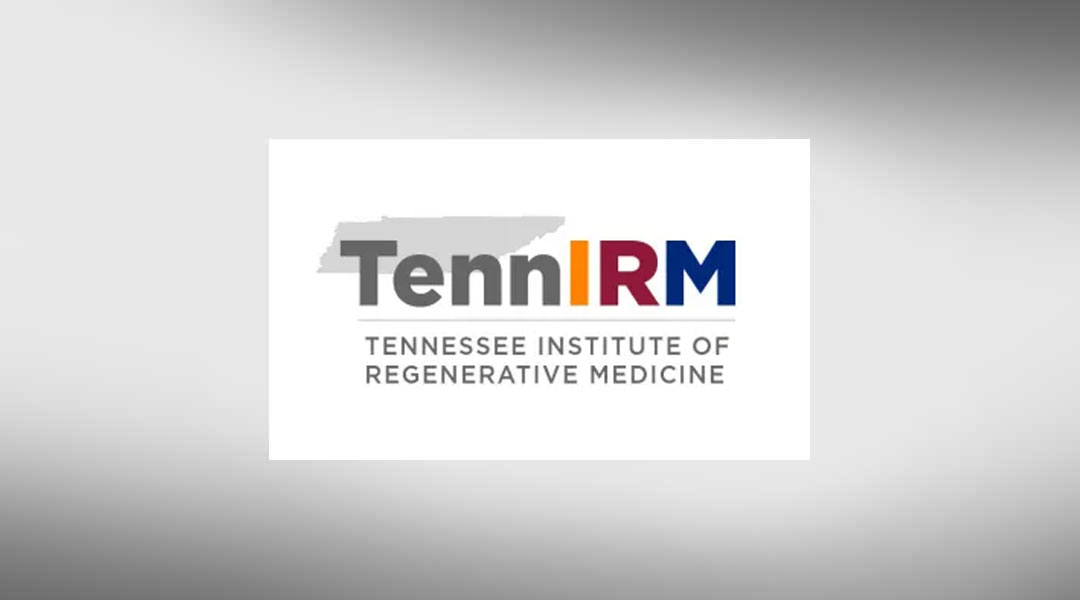A cutting-edge University of Tennessee Health Science Center institute, the Memphis Institute of Regenerative Medicine, is rebranding to reflect its growing reach across the state. Effective this month, it will be known as the Tennessee Institute of Regenerative Medicine (TennIRM) in recognition of new statewide partners.
As part of the rebranding, Gabor Tigyi, MD, PhD, DSc, Harriet Van Vleet Endowment Professor, Department of Physiology and associate vice chancellor for Research, Global Cooperation and Industry Relations, was named executive director. James Carson, PhD, FACSM, senior associate dean for Research and Graduate Studies and professor and chief of Rehabilitation Sciences, will assume the role of deputy director. Y. James Kang, PhD, professor in the College of Graduate Health Sciences, is the institute’s new chief scientist.
Formed in 2017 to perform basic, clinical, and translational research in the areas of regenerative medicine including stem cell biology, 3D bioprinting, and tissue engineering, and gene editing, TennIRM’s goal is to translate scientific discoveries into new organ repair and replacement therapies for people suffering from organ damage.
“TennIRM represents the cutting edge of personalized medicine by unleashing the natural healing powers of dormant stem cells residing in our tissues,” Dr. Tigyi said. “Humanity survived without medicines for centuries by relying only on the body’s ability to repair itself. Regenerative medicine explores the therapeutic potential of these healing powers by combining it with the most advanced molecular methodologies and bioengineering technologies available. The availability of regenerative medical bio-devices sculpted from the patient’s own cells will revolutionize medical practice and TennIRM will pave the way toward this goal in our state and beyond.”
The institute brings together the expertise of UTHSC, the University of Memphis, and St. Jude Children’s Research Hospital. It has grown from 36 members to 70, most recently welcoming the College of Veterinary Sciences and the Regenerative Medicine Laboratory at the University of Tennessee, Knoxville, and the Joint Institute of Biological Sciences at the Oak Ridge National Laboratory.
The creation of TennIRM was spurred by Steve Goodman, PhD, vice chancellor for Research at UTHSC, recruiting Dr. Kang and his team at Revotek Ltd., a leader in the production of 3D bioprinted human blood vessels, to Memphis to establish their USA home. Revotek USA had been preparing 3D bioprinted blood vessels in the UTHSC Plough Center prior to the pandemic, and is in the final stage of receiving the FDA approval to move forward with watershed clinical trials.
“TennIRM and CTN2 are positioning our region and Tennessee to take a leadership role in regenerative medicine and stem cell therapeutics,” Dr. Goodman said. “These technologies will be a major driver for advances in the practice of medicine and in economic development and job creation for the remainder of the 21st Century.”
The tremendous economic potential and entrepreneurial nature of regenerative medicine has helped TennIRM attract a strong group of industry advisers. Shannon Brown, senior vice president of FedEx, chairs the TennIRM Industry Advisory Committee; Ann Burgess, former vice president for Global Biologics with Wright Medical Group N.V., is co-chair. Other TennIRM industry advisory committee members include Reid Dulberger, chief economic development officer, EDGE for Memphis and Shelby County; Dan Shimko, director and technical fellow, Spinal Biologics R&D, Medtronic; Dun Liu, Revotek USA; Phil Cestaro, executive director, Clinical Trials Network of Tennessee (CTN2); and Lilliam A. Baez, director, U.S. Commercial Service, United States Department of Commerce and Robert Blaudow, Department Head, Natural Sciences at Southwest Tennessee Community College.
TennIRM has revealed the strength of regenerative medicine as a research category within the state’s academic community. In TennIRM’s four years of existence, its research group members have published over 400 journal articles, and have generated over $39 million in extramural award funding for their various research projects. It has also been instrumental in helping UTHSC gain the recognition of national and global organizations.
The institute was recently invited to become a member of The Regenerative Medicine Foundation, a comprehensive global network uniting the world’s leading researchers, medical centers, universities, labs, businesses, funders, policymakers, experts in law, regulation and ethics, medical philanthropies and patient organizations. Membership in the foundation afforded TennIRM the opportunity to present during the Hot Topics session at the virtual World Stem Cell Summit in June.
TennIRM also is bringing a major international scientific conference stateside for the first time. Together with the Society of Experimental Biology and Medicine, TennIRM is hosting the 2021 International Experimental Biology and Medicine Conference in Memphis this fall. The conference this year is focused on regenerative medicine.

